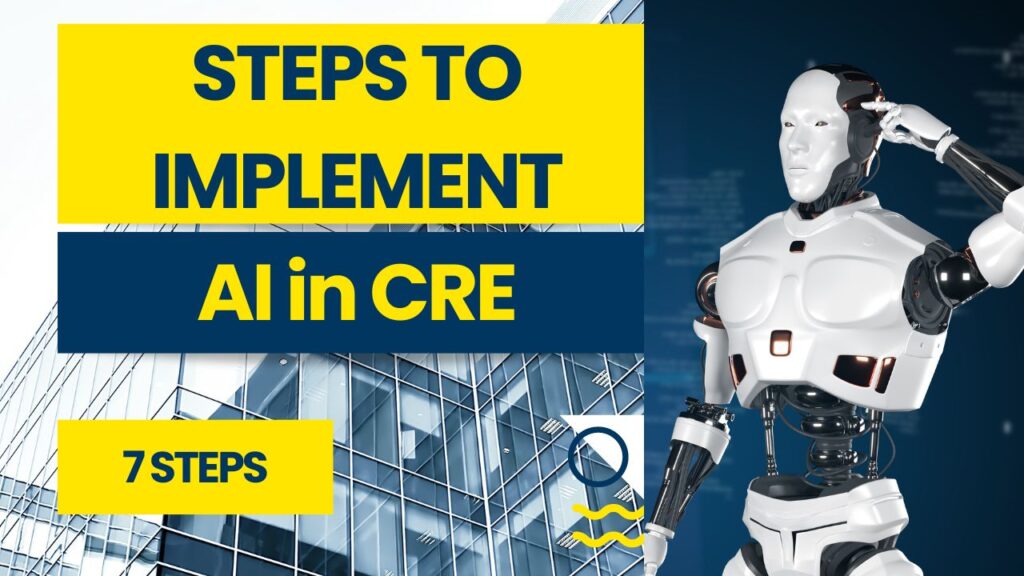More often, AI has gradually been adopted in various industries in the past several years. Today it is nearly impossible to identify industries in which AI technologies are not implemented. Artificial intelligence refers to digital technology that mixes clever algorithms with vast volumes of data for processing.
This allows the software to identify logical patterns that may be utilized for a variety of tasks. Not every artificial intelligence has the goal of imitating human thought processes. Actually, artificial intelligence performs far better than human thought.
The deployment of Artificial Intelligence is likely to profoundly revolutionize the commercial real estate (CRE) market. Out of all the elements of AI and its related technologies, it is proposed that AI will lead to the modernization of Property creation, management and its sales in areas of decision making, operations, tenant satisfaction and risk mapping.
AI AND COMMERCIAL REAL ESTATE BUSINESS

Automation is becoming increasingly sophisticated due to AI technology advancements driven by big data as well as improved algorithms.
Moreover, due to its ability to correctly predict market trends and property prices, predictive analytics has completely altered tasks for investors and property managers. Therefore, nowadays, in the real estate sector, these AI-driven technological advancements have proven to be quite beneficial.
AI helps in lead generation, staging, sales and real estate marketing when it comes to the Commercial Real Estate (CRE) industry. Further, it contributes to redefining the purchasing, selling, and investing procedures performed by real estate companies.
Like these, AI can help the commercial real estate sector in a number of ways. Through reading this article, you can have a clear idea about the solutions of Artificial Intelligence (AI) in transforming the commercial real estate sector.
Let me take you to the main content of this article, but before that, let me simply explain the six main steps that implement AI in the commercial real estate business.
STEPS TO IMPLEMENT AI IN COMMERCIAL REAL ESTATE BUSINESS

Businesses that use artificial intelligence (AI) in the real estate industry can enhance development along with efficiency, maintaining an edge over others, and providing competitive services. AI use in the real estate industry requires an approach that is systematic.
Let’s see those steps to implement AI in the Commercial Real Estate industry
- Identify business needs and goals
- Develop a data strategy
- Integrate or build AI systems
- Test the AI solution
- Train AI models
- Implement AI solutions
- Monitor and optimize
Now, I hope you have got an initial idea about the role of AI in commercial real estate and how to implement AI in Commercial real estate. Using these strategies while stepping into implementing AI in your commercial real estate sector can optimize a number of advantages.
Undoubtedly, the aforementioned examples are not the only way that artificial intelligence (AI) is being used in the commercial world of commercial real estate.
Let me step into the main part of this piece of writing. Yes!! I am going to write about the ways how AI transforms the commercial real estate sector with its smart solutions.
HOW AI TRANSFORM COMMERCIAL REAL ESTATE WITH SMART SOLUTIONS
01. Investment Strategies Powered by AI

In order to help in making decisions and managing their portfolios, the Commercial Real Estate investors could benefit from AI’s powerful tool set. In order to provide investors with enhanced predictive modelling skills, AI-enabled systems can process enormous volumes of historical data, market patterns, and economic indicators. Investors may therefore find investment possibilities, improve their portfolios, and predict possible returns more quickly and accurately.
Moreover, time-consuming procedures such as data entry, financial loan modelling, and transaction analysis are also simplified by AI in the commercial real estate industry.
In order to improve data-driven decision-making and do away with the need for more broad models, AI-automated systems may rapidly create customized financial models for certain projects.
02. Improved Reduction of Risk

Since AI can use data analytics and machine learning, it can discover and evaluate a wide range of threats that were previously hard to measure.
Furthermore, AI can boost financial risk management by automating evaluations of market circumstances, loan terms, and cash flows associated with specific properties or whole portfolios. Investors are given fresh insights to assist them in making decisions that preserve their investments and maximize profits through in-depth, real-time research.
AI-powered solutions offer a thorough understanding of all the possible risks to Commercial Real Estate property investments that range from equipment failures and hazards to the environment to tenant defaults and fluctuations in the markets.
03. Streamlined Accounting Processes

AI-powered solutions that can significantly change how Commercial Real Estate businesses manage ongoing financial transactions and long-term financial planning are made feasible through the automation of repetitive processes coupled with sophisticated analytical capabilities.
For instance, invoices can possibly be read and understood by AI technology, which can then assign them to the appropriate attributes and process them with the least amount of human involvement. This lowers the likelihood of mistakes and speeds up time required for processing.
AI’s capacity to evaluate massive amounts of financial data offers Commercial Real Estate businesses insightful information beyond automated processes.
04. Transformation of Leasing and Property Management

Artificial intelligence (AI) has the potential to revolutionize commercial property management and by introducing new technology in their buildings, a large number of Commercial Real Estate professionals are welcoming these developments.
Commercial leasing is changing in many ways, from locating and attracting renters to handling contracts and data, because of artificial intelligence (AI) and machine learning (ML).
Throughout the leasing process, artificial intelligence (AI) strategies could decrease human bias, find the most promising leads, and enhance decision-making.
AI offers landlords, brokers, and renters several benefits when it comes to the leasing process:
1. Finding and attracting tenants:
In order to create leads, match renters with suitable properties, and improve pricing and marketing tactics, artificial intelligence (AI) can evaluate enormous volumes of data from multiple sources, including market trends, demographics, geography, preferences, and behavior.
AI may also customize and automate communication to clients using;
- Chatbots
- Voice assistants
2. The development of smart contracts avails via the application of NLP (natural language processing) can help brokers and landlords in writing and reviewing leases and negotiating them. In addition, through OCR (optical character recognition) utilization and data mining, AI can also gather, sort and analyze data from lease contracts and agreements, invoices, receipts, and other bills
3. AI may improve the rental experience for tenants by giving them voice or mobile device access to and control over a range of facilities and services, including parking, security, lighting, temperature, and maintenance.
Tenant satisfaction is increased and property managers are able to focus on more crucial duties because of the AI-infused interactions.
AI is also at the top of the list of smart building management, with solutions that can be used to minimize operational downtime, optimize energy use, identify possible maintenance problems, and continually monitor building systems.
05. Market Opportunities Driven by AI

AI shows not only upgrades and effectiveness in CRE processes, but also new opportunities for property owners and investors.
AI clusters are also starting to form in areas within and beyond the recognized tech hotspots. They are typically located close to famous academic institutions. Investors in commercial real estate (CRE) observe an increasing necessity for modern technology-integrated and dynamic and or versatile real estate such as co-working spaces.
06. Improved Decision-Making
Application of AI in commercial real estate can revolutionize thinking throughout the industry through its ability in aspects such as predictive modeling. AI generates exact information and predictions by utilizing enormous volumes of data, such as market trends, past performance measures, as well as economic indicators.
Would you rather watch a video?
So far, I have discussed the top 6 transformations that AI made in the Commercial Real Estate sector. However, there is more to discuss about the fantastic features of AI when it comes to the Real Estate sector.
You must plan an AI implementation strategy and have a comprehensive understanding of the challenges you need to overcome before you can pick the best solution. Contacting AI experts and working together to obtain a superior solution is the best approach to gaining knowledge about artificial intelligence technology if you currently lack knowledge in AI. When using AI, they will support you through every step to make sure your company gets the best results.
Notwithstanding, AI’s use and impact in commercial real estate will grow in importance as it continues to advance. The use of AI in real estate will undoubtedly be crucial in the future. Enhanced search capabilities on listing websites, perfect property pricing, sophisticated building project planning, and even clever workplace management are just a few of the numerous advantages artificial intelligence (AI) offers to commercial Real Estate businesses.
FAQs
01. What are the other applications of AI in commercial real estate to implement?
Listing description
Virtual property tour
Lead generation
Property search
Property analysis
Customer support
Predictive analysis
Fraud and compliance detection
Virtual staging, etc.
02. What are the challenges of adopting AI in the Commercial Real Estate?
Data privacy and security
Resistance to change
High cost
Data accessibility and quality
Training needs and skill gaps, etc.


